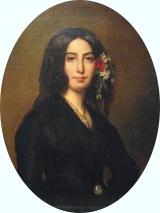Ki randizott Alfred de Musset-szel?
Caroline Jaubert Alfred de Musset dátummal kelt, ? és ?. között A korkülönbség 7 hónapig és 6 napig tartott volt.
Louise Colet Alfred de Musset dátummal kelt, ? és ?. között A korkülönbség 0 hónapig és 2 napig tartott volt.
Aimée d'Alton Alfred de Musset dátummal kelt, ? és ?. között A korkülönbség 0 hónapig és 9 napig tartott volt.
Louise Rosalie Allan-Despreaux Alfred de Musset dátummal kelt, ? és ?. között A korkülönbség 0 hónapig és 9 napig tartott volt.
Rachel Félix Alfred de Musset dátummal kelt, ? és ?. között A korkülönbség 10 hónapig és 2 napig tartott volt.
Anaïs Bosio Alfred de Musset dátummal kelt, ? és ?. között A korkülönbség 2 hónapig és 3 napig tartott volt.
George Sand Alfred de Musset dátummal kelt, és . között A korkülönbség 6 hónapig és 5 napig tartott volt.
Alfred de Musset

Alfred de Musset (Párizs, 1810. december 11. – Párizs, 1857. május 2.) francia költő, drámaíró, a francia romantika kiemelkedő képviselője. A Victor Hugo köré csoportosult költők közül az egyik legjelentősebb. Magyar vonatkozású műve: Barberine rokkája (1835).
Bővebben...Caroline Jaubert
Caroline Jaubert, née Caroline d'Alton le à Coblence et morte le à Paris 9e, est la maîtresse et « marraine » d'Alfred de Musset, ainsi que la correspondante de Berryer et Heinrich Heine. Femme de salon, elle est notamment l'auteur de Souvenirs.
Bővebben...Alfred de Musset

Louise Colet

Louise Colet (French: [kɔlɛ]; 15 August 1810 – 9 March 1876), born Louise Revoil de Servannes, was a French poet and writer.
Bővebben...Alfred de Musset

Aimée d'Alton
Alfred de Musset

Louise Rosalie Allan-Despreaux

Louise Rosalie Allan-Despreaux (1810 – March 1856) was a French actress.
She was "discovered " by François Joseph Talma at Brussels in 1820, when she played Joas with him in Athalie. At his suggestion she changed her surname, Ross, for her mother's maiden name, and, as Mlle. Despreaux, was engaged for children's parts at the Comédie-Française. At the same time she studied at the Conservatoire. By 1825 she had taken the second prize for comedy, and was engaged to play ingenue parts at the Comédie-Française, where her first appearance in this capacity was as Jenny in L'Argent on 8 December 1826.
In 1831 the director of the Gymnase succeeded in persuading her to join his company. Her six years at this theatre, during which she married Allan, an actor in the company, were a succession of triumphs. She was then engaged at the French theatre at St. Petersburg, a scene praised by the Russian aristocracy and the Imperial family.
Returning to Paris, she brought with her, as Legouve says, a thing she had unearthed, a little comedy never acted until she took it up, a production half-forgotten, and esteemed by those who knew it as a pleasing piece of work in the Marivaux style: Un Caprice by Alfred de Musset, which she had played with success in French in St. Petersburg. Her selection of this piece for her reappearance at the Comédie-Française (1847) laid the cornerstone of Musset's lasting fame as a dramatist. In the following year his comedy Il ne faut jurer de rien was acted at the same theatre, and thus led to the production of his finer plays.
Among plays by other authors in which Mlle Allan-Despreaux won special laurels at the Comédie-Française, were Par droit de conquête, Péril en la demeure, La joie fait peur, and Lady Tartuffe. In the last, with a part of only fifty lines, and playing by the very side of the great Rachel, she yet held her own as an actress of the first rank.
Mlle Allan-Despreaux died in Paris, in the height of her popularity, in March 1856.
Bővebben...Alfred de Musset

Rachel Félix

Élisabeth-Félice Rachel, ismertebb nevén egyszerűen Rachel (Mumpf, 1821. február 21. – Le Cannet, 1858. január 3.) francia színésznő.
Élisa Félix néven született a svájci Mumpfban (Aargau kanton). 1830 körül érkezett Párizsba, ahol színjátszást és éneket tanult. 1837-ben lépett fel először, és ezt követően vette fel a Rachel művésznevet. Nagy sikerekkel lépett fel Európa fővárosaiban Jean Racine, Voltaire, Pierre Corneille, Eugène Scribe darabjaiban. Charlotte Brontë Villette című regényének Vashti nevű szereplőjét Rachel ihlette, akinek Brontë látta egy alakítását Londonban.
Róla kapta nevét az egyik kötőgép (raschel-gép, így, sch-val, mert a szóban forgó gépet Németországban készítették!), amelynek termékét ő népszerűsítette.
Bővebben...Alfred de Musset

Anaïs Bosio

Angélique Félicité Anaïs Bosio, par son mariage marquise de La Carte, est une salonnière française née le à Paris et morte le à Pau.
Bővebben...Alfred de Musset

George Sand

Amandine Aurore Lucile Dupin, Baronne Dudevant (Párizs, 1804. július 1. – Nohant-Vic, 1876. június 8.) írói álnevén George Sand (kiejtése kb. „Zsorzs Szand”, a „d” nem néma) francia írónő, regényíró, dramaturg, újságíró, irodalomkritikus.
Bővebben...